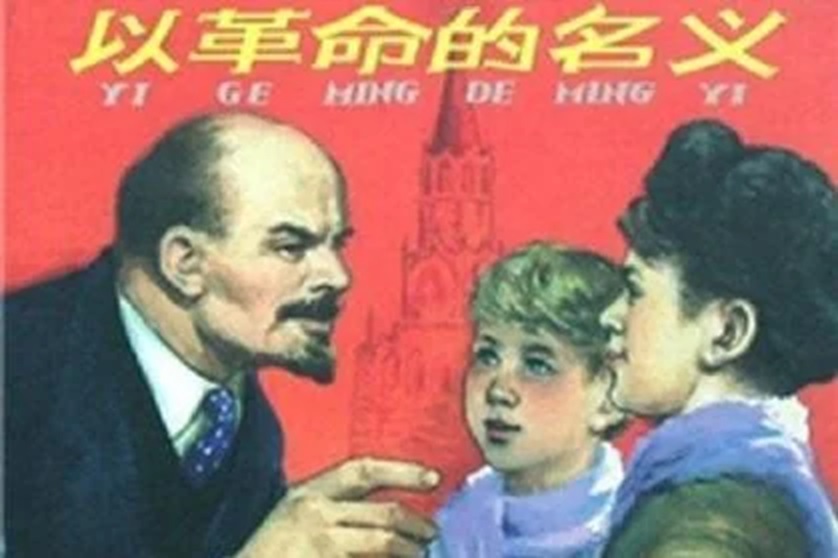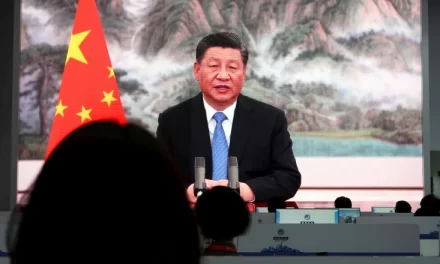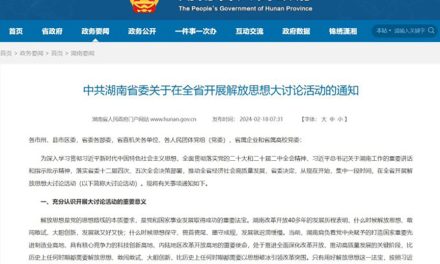I believe that most moviegoers in mainland China who are over 50 years old will have seen a movie called “In the Name of Revolution,” and are familiar with a sentence spoken by Lenin in the film: “Forgetting the past means betrayal!”
I saw this movie for the first time in Guangzhou when I was 21, and was profoundly surprised. There are two reasons: first, the “tall images” of Lenin and Dzerzhinsky shown in the film, and second, the wonderful performances of the two main actors, Fang Jufen (1929-2020-12) and Qin Kun (1936-).
The film tells the story of Lenin, Dzerzhinsky and two orphans in the winter of 1918. The two leaders’ “fatherly care” for the next generation shows the importance they attach to cultivating successors in the revolutionary cause. In the film, Lenin has an approachable image, and is played by Zhou Zheng; Dzerzhinsky appears to be witty and decisive. And the two children give the viewer the impression of being pure, lively, kind yet tenacious. The scenes of hunger and poverty, and the ferocity and cruelty of the enemy, are particularly shocking.
At the end of the film, Lenin makes an impassioned speech about the performance of the younger generation as he has seen them: “Despite being hungry and cold, despite having no clothes or shoes, they still moved forward bravely, ready to sacrifice their lives for the cause of a new world. In the name of revolution, think about the past… No, Only insignificant people will forget, while those for whom we live will never forget… they will never forget, because forgetting means betrayal…”
The film is adapted from a Soviet play. The original author Mikhail Shatrov was born in Moscow in 1932 into an engineer family. In 1956 he graduated from the Moscow Mining Institute. The following year, he wrote the play “In the Name of Revolution,” which won the first prize at the “1957 All-Soviet Drama Performance Conference to Celebrate the 40th Anniversary of the Great October Socialist Revolution.” After being translated into Chinese, the China Children’s Art Theater put it on stage. It was made into a movie by Beijing Film Studio in 1959, and screened in major cities across the country on January 1, 1960.
Sixty-four years have passed, and I am already an old man. My left eye was recently injured and my hearing in one ear has been greatly reduced. Fortunately, when I put on earphones and rewatched the video online, I could still see and hear it clearly. And the bottom line is: no matter the play or the movie, they are both lies. However, the method of lying is very clever, and people who do not know the truth can easily be brainwashed by the work.
Did Lenin really love his people as though they were his own children? Let us borrow a passage from Mao Zedong. In December 1925, Mao clearly pointed out in an essay in the periodical Political Weekly titled “Reasons for Publishing Political Weekly” that “Our chosen method of counterattacking the enemy does not involve much debate, and instead only faithfully reports the facts of our revolutionary work.”
What did Lenin do when faced with the tragic reality that many millions of Soviet Russian subjects under his rule were hungry and desperate? He adopted a two-pronged approach. On the one hand, he sent thousands of “grain-collection teams” to the traditional grain-producing areas to search for grain stored in farmers’ homes. And on the other, he asked Maxim Gorky to go abroad to try to lobby notables from Germany, France, Italy and other countries in continental Europe to raise donations to purchase grain and have it transported to Soviet Russia free of charge to save these millions of hungry people.
These grain-collection teams all wore leather jackets and were armed with live ammunition. They broke into the homes of ordinary farmers in Ukraine and other places who had been farming for generations and ordered them to hand over their grain. Although they had already paid the so-called “agricultural tax” in full and on time in accordance with the regulations of the local Soviet governments, what was left was only a minimal ration for the family to survive on until the next autumn harvest, but this too was now confiscated. The collection teams still thought it was insufficient, and often dug several feet into the ground to find more. The scene was similar to one depicted in the poem “Bureaucrat in the Stone Trench,” written by Du Fu, a poet in the Tang Dynasty.
As a close friend of Lenin, Gorky had previously collaborated with the Cadet Party and the Socialist Revolutionary Party in the country. (Both parties participated in the February Revolution in Russia in 1917 to overthrow the tsarist regime, and were still legal parties in the Soviet Union after the October Revolution.) Russian notables, and in their own names no less, had suggested that the government set up a famine-relief committee, appeal to the West, and ask rich countries to provide relief to the disaster-stricken areas in Russia. Lenin attached great importance to this suggestion, and on July 21, 1917, the All-Russian Central Executive Committee made a decision to establish the committee. It had significant power across the country, as well as representatives abroad. The literary veteran Korolenko agreed to bear the name of honorary chairman. Kamenev served as chairman. Rykov, Lunacharsky and other government officials and celebrities from all walks of life participated in it. Figures included leaders of political parties who had not yet been eliminated, as well as influential scholars, writers, and actors in the West. The number of these people on the committee greatly exceeded the Bolshevik representatives. The Bolsheviks hoped to use their connections to obtain aid from the West. These public figures were proud of being able to do what they could when their motherland was in danger. They wrote letters to Western government charities and influential figures, and spoke to Western newspapers and magazines, pleading with the West to save the dying Russian people. Their positive activities yielded positive results. Large amounts of relief supplies continued to be shipped to Russia. The French writer Anatole France dedicated the Nobel Prize for Literature he won in 1921 to the disaster-stricken areas in Russia. The United States also distributed a large amount of food aid to Russia. For this reason, Gorky sent a letter to Ms. Adams of the United States on July 10, 1922, speaking highly of the role played by Hoover, later the 31st president of the United States and at that time director of the Relief Administration. The letter stated that “the United States has the right to be proud of its children,” who had worked so fearlessly and brilliantly on the vast [wartime] battlefield, in an environment where infectious diseases were rampant, amid isolation and cannibalism…” (Lan Yingnian’s “The Grave Seekers”, page 017, Cultural Development Publishing House, Beijing, first edition, February 2016)
The notables were thrilled with their achievements and thought they could be on equal footing with the Bolshevik leaders in governing the country together. They were gradually disabused of this notion. The Bolshevik leaders were on top of things, and would not allow the leaders of the bourgeoisIe to cause any trouble. So the government decided to dissolve the committee and killed them all. Lenin was eager to spare Gorky, so he implored him to go abroad for medical treatment as soon as possible. In fact, Gorky did not think that his health was so bad that he had to go abroad. However, he finally left Russia on October 16, 1921, to “recuperate” in Berlin. Previously, he had learned that the aforementioned committee had been disbanded by the Bolshevik authorities and that the figures in it were behind bars. He was shocked. He tried his best to rescue the arrested people and searched for the Bolshevik leaders, but without success. All his work had been in vain. After that, he lived abroad continuously for more than ten years.
From the above, it can be seen that the only thing Lenin cared about was firmly keeping power in his own hands. At that time, Dzerzhinsky was in charge of the Cheka. responsible for investigating and arresting so-called counterrevolutionaries and foreign spies. (The full Russian name of this abbreviated term was The All-Russian Extraordinary Committee for the Purge of Counterrevolutionaries and Saboteurs.)
Therefore, Lenin’s smiling face in the film is just propaganda. But as for Dzerzhinsky’s chilling iron face, it is just right, and such a portrayal is profound.
Let us turn to Fang Jufen and Qin Kun, the actors. The former was 30 years old and the latter 23. It was not easy to play the roles of Petya, an 11-year-old boy, and Varsha, a 14-year-old boy, respectively. Although the actors were both about 1.6 meters tall, they had to have boyish expressions on their faces, which required excellent skills. Fang Jufen received hands-on training from Soviet experts who had come to China, and she had worked even harder subsequently. In the end, her hard work paid off, and she lived up to expectations and became a great success. Qin Kun also received widespread appreciation.
Fang Jufen’s acting career later flourished, and her status blossomed in the manner of sesame seeds. In 1987, she served as the director of China Children’s Art Theater. In 1988 and 1993, she was a member of the 7th and 8th CPPCC National Committee. In 2000, she was appointed as the Honorary President of China Children’s Arts. In 2006, she won the Performing Arts Achievement Award from the All-China Federation of Literature and Art. In 2007, she was awarded the title of “National Drama Artist with Outstanding Contributions” by the Ministry of Personnel and the Ministry of Culture.
What is quite interesting is that her husband, Wang Zheng, was classified as an “anti-Party and anti-socialist rightist” in 1957 because he gave his opinions to Liu Zhiming, the Vice Minister of Culture, who had come to inspect the rectification situation in Eryi. After being duly “rectified” himself in the late 1970s, Wang was promoted step by step, and finally became the Party Secretary of the Chinese Drama Association. In the past twenty years, he has transformed from an anti-party element to a leading member of the party. The changes here are dramatic.
I remember that the author Lu Xun once commented on Mahayana and Hinayana Buddhism, saying, “I first had a prejudice against Buddhism. I thought that the difficult Hinayana religion was Buddhism. When a rich man who drinks alcohol and eats meat can just have the occasional vegetarian meal, he can be called a layman. On the other hand, the other is euphemistically called Mahayana Buddhism and it is more popular, because it is easy to believe, this religion has become frivolous, or even empty.”
Lu Xun added: “When writing about a place, I said that if the flag in the blue sky and white sun is planted far away, the number of believers will definitely increase. But just like Mahayana Buddhism, when lay people are considered as disciples of the Buddha, the precepts are often lost, and they do not know the grandeur of Buddhism. Or is it the corruption of this grandeur?”
And it seems that we can also ask: is it the sublimation of the Communist Party or the degeneration of the Communist Party that transformed the “anti-party elements” of the past into today’s senior officials of the Communist Party of China?
The author Hu Shi once said that tolerance is more important than freedom. What is truly “great, glorious and correct” can accommodate previous dissident elements. In any case, such developments can be regarded as a kind of progress with the times, and can be regarded as a big step towards building a “community with a shared future for mankind!”
Let us return to the “Big Brother” Soviet Union, whose legacy has been mainly inherited by Russia. President Putin neither praised nor criticized Lenin. Putin himself was a KGB officer in East Germany, but he was a civilian who sat in an office and analyzed intelligence data, and not a field operator who performed surveillance or assassination missions. He had neither praise nor disdain for Dzerzhinsky, the founder of the Cheka. There is also no commemorative bronze statue of Dzerzhinsky in front of the KGB headquarters in Moscow. I am afraid that not many people in Russia today remember that his hands were stained with the blood of so-called “counterrevolutionaries.”
A few words should also be said about the Socialist-Revolutionary Party. It was founded in 1902 and belonged to the Second International. It advocated the overthrow of the tsarist regime and the implementation of a federal democratic republic; the implementation of liberal ethnic policies and the separation of church and state; and the socialization of land and factories. The party believed that the socialist revolution should be carried out by peasants, mainly richer peasants, thus opposed the leading role of the proletariat in the democratic revolution, and supported imperialist wars. After the February Revolution of 1917, along with the Mensheviks it became part of the majority in the national soviet, advocating compromise with the bourgeois provisional government. Its leaders served as ministers and prime ministers in that government. The party opposed the October Revolution. After the establishment of the Soviet regime, according to Wikipedia it conducted long-term political activities against the Communist Party and the Soviet regime, and was banned by the Soviet regime in 1920.
This film portrays the Socialist Revolutionaries as a group of thugs specializing in murder, arson, and poisoning, which is clearly biased. It makes no mention of the right- and left-wing divisions within the party. It unjustifiably targets all members with a broad brush. Mao once said that the soul of Marxism-Leninism is concrete analysis of specific situations. This sentence itself is not wrong. For example, before the Kuomintang purged the party in April 1927, Mao was an alternate Central Executive member of the Kuomintang, as well as acting director of its Central Propaganda Department. He was appointed by Sun Yat-sen, the founding father of the country. He was meritorious in mobilizing farmers in Hunan to support the Northern Expeditions. However, his efforts to attack the local landlords caused the defections of landowner officers at all levels in the Northern Expeditions, which hindered the ability of the expedition to expel the warlords. Later, when Mao led the Autumn Harvest Rebellion had failed, he went to the mountains to lead bandits. He was a full-fledged bandit himself. In Lu Xun’s words, he became the “king of the mountain.” The “public wives,” as female revolutionaries were sometimes known, commited murder and arson in all possible ways. During the Anti-Japanese War, Pan Hannian was sent to secretly communicate with the Japanese invaders and Wang Weian. Their mission was 10 percent to resist Japan, 20 percent to deal with those they went to see, and 70 percent was development of the communist movement. The core was to prepare for future world domination. But elaborating on this is excessive. Let us stop here.
The last thing I wish to say here is that both the Chinese Communist Party and the Russian Communist Party have been adept at propaganda and brainwashing. Your author also grew up in environment that celebrated barbarism against enemies of the Party. Looking back on the past, we realize that we must not take the propaganda put out by the Communist Party and its Big Brother apparatus lightly. As the ancients said, to actually write down the record of contemporary evil would be an endless task. We thus must talk about it every year, every month, and every day so that future generations can learn from what we know, what we have seen with our own eyes!
The above are the author’s thoughts after watching the film “In the Name of Revolution” again, and I am pleased to share them with readers!
This piece was translated from Yibao Chinese. If republished, please be sure to add the source and link https://www.yibao.net/?p=247917&preview=true before the text when reposting.
The author’s point of view does not necessarily represent that of this journal.























